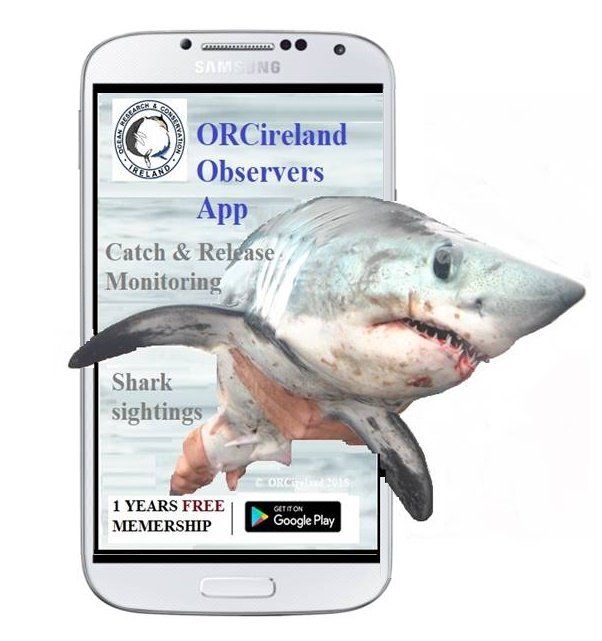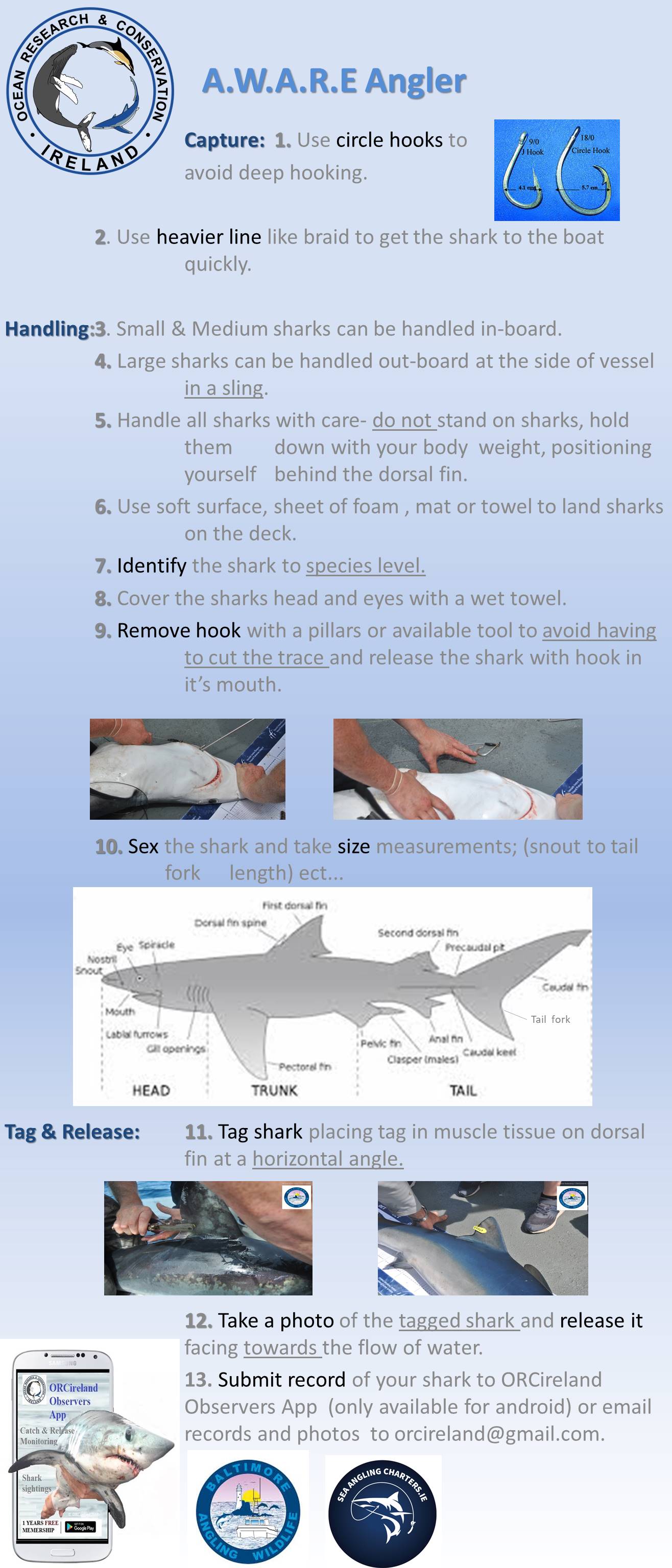Satellite tagged sharks reveal movement patterns, more robust abundance estimates, and overlap with commercial long line fisheries in the North Atlantic.
A new study has revealed detailed behaviour of shark movements and enhanced abundance estimates through analysis of depth data collected from two sharks which were tagged with pop-up satellite archival tags and modelling the amount of time the sharks spent swimming in the upper layer of the ocean and therefore would be detected by aerial surveys.
A new study which has been published in the journal PloS One , used satellite archival tags and availability models to determine the likelihood of detecting sharks through aerial surveys. The study was carried out by University College Cork (UCC) researchers who, through satellite tagging two blue sharks ( Prionace glauca ) in Irish waters , have shown that they preferred surface waters whilst swimming over the the continental shelf and during the day, and thus may be detectable during aerial surveys.
The study also used availability models to account for bias in abundance estimates from distance sampling from aerial surveys, and found that using the correction for availability bias, abundance estimates were seven times higher. This is important to consider when applying correction factors to studies. The paper also confirmed previous consensus that blue shark did not occur in Irish waters during the winter months, or not at least, not in large numbers. Blue shark undergo cyclical seasonal migrations to warmer lower-latitudes during the winter across the Atlantic (Nykanen et al.,
2018). This was also confirmed by the observed southerly migration of five blue sharks previously satellite tagged in Irish waters (Doyle et al.,
2015).
There is a global concern about the population status of elasmobranchs due to cumulative impacts from human induced threats, such as overfishing and bycatch, and the consequences of the removal of such marine top predators is ecosystems collapse. In some parts of the Atlantic, there has been sharp reductions of blue sharks of 50 -80% in only a few generations, with an estimated 10 million blue sharks killed every year.
Historically, poor record keeping, lack of reporting, or even misidentification of sharks has led to a knowledge gap for the best way to manage pelagic sharks. Developments in satellite tracking and global position systems (GPS) allow researchers to track shark movements and ship movements in the high seas with greater accuracy. These new tools create an opportunity to further study the overlap between fishing effort and shark movements.
Another study published in the Proceedings in the National Academy of Sciences, has shown an 80% overlap between important areas for sharks and Spanish and Portuguese pelagic long-liners. GPS data was not available for Japanese, Canadian or American fleets in the eastern Atlantic. Blue and mako sharks accounted for ~ 95% of the oceanic sharks caught in Atlantic fisheries. The overlap in fishing location and habitat use between the sharks and longline fleets results in tens of millions of sharks being caught each year (Queiroz et al., 2016).
Bycatch and illegal fishing are not far from our own shores with recent reports of illegal shark finning off the south coast of Ireland.
Read more here: https://www.orcireland.ie/angling-for-conservation.
Angler's in Ireland have long been keepers of one of our best kept secrets, that Irish waters are seasonal homes to a variety of shark species, from blues, to porbeagle ( Lamna nasus ), to shortfin mako ( I surus spp. ) and thresher shark ( Alopias spp.). Anglers are also long-term advocates of shark conservation in Irish waters, and contribute to a wealth of knowledge through their catch and release and number tagging efforts under Inland Fisheries Ireland Marine Sport Fishing Tagging Programme. Anglers using catch and release angling can help researchers through citizen science by submitting records of sharks caught and released to the "ORCireland Observers" App and by emailing a photo of the shark to orcireland@gmail.com and directly to Inland Fisheries Ireland via their website.
Follow our "Angling A.W.A.R.E Best Practices"(A.W.A.R.E- Animal Welfare Aware Responsible Encounters)to ensure welfare of the animals caught and released. Remember, never stand on a shark with your foot or hold it by the tail! Please try also to reduce littering in the sea when angling, including throwing cigarettes and plastic overboard.
References
:
Doyle, Thomas K, Bennison, Ashley Jessopp, Mark, Haberlin, Damien Harman, Luke A. 2015. A dawn peak in the occurrence of ‘knifing behaviour’ in blue sharks. Animal Biotelemetry, 46, 2050-3385
- https://doi.org/10.1186/s40317-015-0084-1
-
Nykänen M, Jessopp M, Doyle TK, Harman LA, Cañadas A, Breen P, et al. (2018) Using tagging data and aerial surveys to incorporate availability bias in the abundance estimation of blue sharks ( Prionace glauca
). PLoS ONE 13(9): e0203122. https://doi.org/10.1371/journal.pone.0203122
.
Queiroz, N., Humphries, N. E., Mucientes, G., Hammerschlag, N., Lima, F. P., Scales, K. L., … & Sims, D. W. (2016). Ocean-wide tracking of pelagic sharks reveals extent of overlap with longline fishing hotspots. Proceedings of the National Academy of Sciences
, 113
(6), 1582-1587.
© Ocean Research & Conservation Ireland (ORCireland) and www.orcireland.ie , est. 2017. Unauthorized use and/or duplication of this material without express and written permission from this site’s author and/or owner is strictly prohibited. Excerpts and links may be used, provided that full and clear credit is given to Ocean Research & Conservation Ireland and www.orcireland.ie with appropriate and specific direction to the original content.
SHARE THIS ARTICLE
















